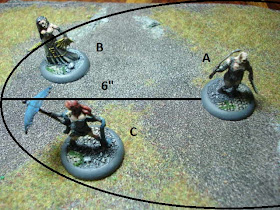Editors Note - This tutorial is for version 1.5 of the Malifaux rules and has been left available for reference only. Some Malifaux 2nd Edition Tutorials can be found here...as well as quite a few of these old ones, lol.
The Companion rule in Malifaux is one of the rules that people tend to over-think and make more difficult than it actually is. We'll go through this step by step so you can see how simple it really is ;-)
Firstly for a model to be able to 'Companion' it will rather obviously need to have the Companion rule. This rule will specify either a specific model or model type on the card like so...
This means that this model has the Companion rule and that (in this case) it applies to Sybelle. Sometimes this rule will apply to a more general type of model such as in the case of certain Totems...
In the above case this model can Companion with a model with the type 'Master'.
Before activating a model with Companion we need to nominate any number of the referenced model or models within 6" of one another. Those models then activate at the same time. Choose one of the models to activate first and then complete it's entire activation before moving onto the next one until all the nominated models have completed their activations. Admittedly that does sound complicated but it really isn't...some examples will show how easy it really is.
It's worth mentioning that just because you can Companion all the models of the appropriate type doesn't mean you have to. You can miss out any model that you don't wish to include...however once a model is nominated into the Companion group then you have to activate it as part of that group so choose carefully.
Example 1
Lets say Seamus the Mad Hatter (A) wishes to Companion with his Totem, the Copycat Killer (B). Before doing anything else Seamus (A) declares that he's going to Companion with the Copycat (B). The Copycat has the rule Companion (Seamus) so this is fine. They're clearly within 6" of one another (measure anyway though...just in case) so everything is fine. We can now activate our group of Companions (In this case Models A and B) in any order we wish...but we must complete each models activation before moving onto the next. We could activate Seamus (A) first and then the Copycat Killer (B) or the Copycat Killer (B) and then Seamus (A)...it's entirely up to you.
Example 2
 |
| In this case we've measured from Model A but as long as the group of models is within 6" of one another it wouldn't have really mattered which one we started with ;-) |
The group consists of Sybelle (A), Rotten Belle (B) and Rotten Belle (C). These can be activated in any order you wish but the nominated model must complete it's activation before moving onto the next one. So for example you could activate a Belle, then Sybelle, then the last Belle or a Belle, another Belle and finally Sybelle, etc. Once the 'group' is established the activation order is up to you.
That example was fairly simple. here's a more complicated scenario.
Example 3.
This seems incredibly complicated but as long as we break it down it's basically the same as examples 1 and 2. We'll cover a number of different scenarios using the same diagram.
Scenario 1
The Belles (B,C,D,E,F and G) have decided that overkill is the order of the day and wish to all activate at the same time if possible. All the Belles have the rule Companion Sybelle so everything should be fine as long as they're within 6" or her...however after measuring we find that unfortunately model G is further than 6" from Sybelle (A) and cannot join in. This makes our Companion group five Belles of various types (B,C,D,E and F) and Sybelle (A). As in previous examples these models can activate in any order they wish (they must as mentioned before each complete their activation before moving onto the next model though).
Scenario 2
Added complications...
Certain models in Malifaux have abilities that are similar to Companion but not quite. They usually have the same written effect of activating a model out of sequence but often have additional limitations. Seamus (1) has one of those abilities (in his case it's called 'Womaniser') that allows him to activate a model with the 'Belle' type after his own activation as completed (Range 6", same as Companion). He's not the only model with this kind of ability so I thought we best cover it here ;-)
Seamus (1) has called Companion as his Totem has the rule Companion (Seamus) and is within 6" this is fine. He then uses his Womaniser ability to activate a Belle when he finishes his activation and this can be applied to Belles (3/G) or (4/F) as they are within range and just to complicate matters he picks (4).
So Seamus (1) and the Copycat Killer (2) can activate in any order they choose followed by Belle (4/F). Because that Belle has the Companion (Sybelle) rule she could (at the beginning of her activation) create a Companion group consisting of herself (F) and Belles (B,C,D and E) and Sybelle (A).
This means that we have a group consisting of Seamus (1) and the Copycat Killer (2) which activate in any order they wish followed by a 2nd group consisting of models (A,B,C,D,E and F) which also activate in any order they wish...Lets hope his opponent is feeling patient this game, lol.
So that's the Companion rule (hopefully) made simple for you. Feel free to post any specific questions in the comments section and I'll answer them as soon as possible.





No comments:
Post a Comment